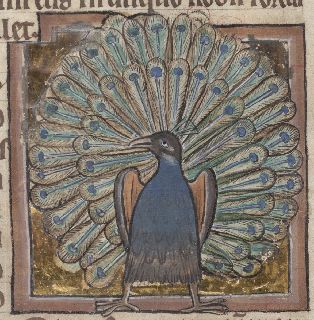Peacock
| Latin name: | Pavo |
| Other names: | Paghone, Pagó, Paon, Paone |
| Category: | Bird |
A bird with a terrible voice and flesh too hard to cook
General Attributes
The flesh of the peacock is so hard that it does not rot, and can hardly be cooked in fire or digested by the liver. Its voice is terrible, causing fear in the listener when the bird unexpectedly begins to cry out. Its head is like a snake, its breast is sapphire colored, it has red feathers in its wings, and has a long green tail adorned with spots that look like eyes. If it receives praise for its beauty, it raises its tail, leaving its rear parts bare. When it suddenly awakes it cries out, because it thinks its beauty has been lost. It is a bird with great foresight. Its feet are very ugly, so the peacock refuses to fly high in order to keep its feet hidden.
Hildegard von Bingen has an unusual description of the peacock: "Before there was a peacock, certain small animals capriciously mingled with certain birds in coitus; whence peacocks were born. ... The male peacock has devious, unclean habits. It sometimes mixes in coitus with small animals and little beasts. ... When the peahen lays her eggs, she hides them so the male does not see them. It is as if she were ashamed to have brought forth eggs and to have generated a chick covered with an eggshell, rather than one with bare flesh. The male hates the eggs and breaks them if he finds them. ... The male seeks a certain altitude at which he knows the air is blowing, which will quickly bring forth his feathers in great numbers and length." (Throop translation)
The peacock is the male peafowl. The female, the peahen, also appears in some manuscripts.
Allegory/Moral
The hard flesh of the peacock represents the minds of teachers, who remain unaffected by the flames of lust. The fearful voice of the peacock is like the voice of the preacher who warns sinners of their end in hell. The "eyes" on the peacock's tail are to signify the ability of the teachers to foresee the danger we all face in the end. The raising of the peacock's tail when it is praised should remind us to not let pride from praise affect us, so we do not expose our ugly vanity.
The Aberdeen Bestiary, following a biblical quote saying that Solomon sent expeditions to bring back peacocks, has a two page sermon on the allegorical meaning of this theme.
Uses Magical, Medical, Alchemical and Culinary
A precious stone grows in the head of an old peacock. The eggs of the peacock can be used to prepare a golden-colored pigment.


